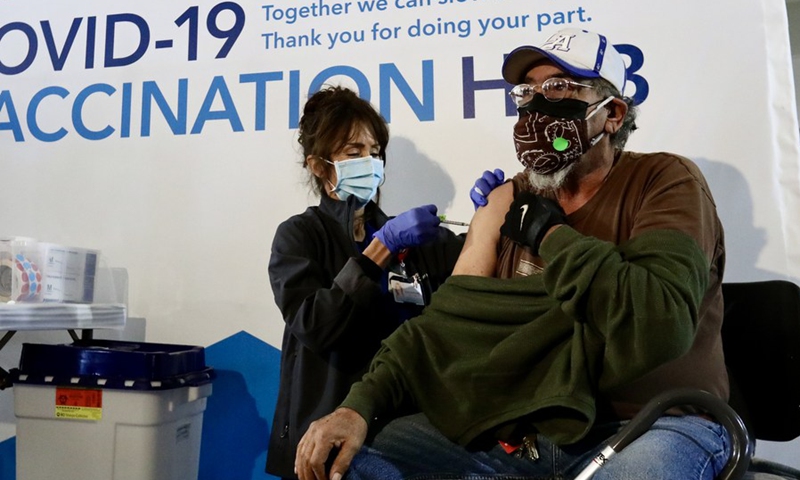
A health care worker administers a dose of COVID-19 vaccine to a recipient at a new vaccination site in the California Polytechnic State University in Pomona, Los Angeles County, California, the United States, Feb. 5, 2021.(Photo: Xinhua)
U.S. officials are anticipating the supply of COVID-19 vaccines to outstrip domestic demand by mid-May if not sooner, and are grappling with what to do with looming surpluses when vaccine scarcity turns to glut, reported The New York Times on Saturday.
U.S. President Joe Biden has promised enough doses by the end of May to immunize all of the U.S. adults, but between then and the end of July, the government has locked in commitments from manufacturers for enough vaccine to cover another 100 million people -- "tens of millions more than the nation's entire population," said the newspaper.
"Whether to keep, modify or redirect those orders is a question with significant implications, not just for the nation's efforts to contain the virus but also for how soon the pandemic can be brought to an end. Of the vaccine doses given globally, about three-quarters have gone to only 10 countries. At least 30 countries have not yet injected a single person," said the report.
Meanwhile, global scarcity threatens to grow more acute as nations and regions clamp down on vaccine exports. With infections soaring, India, which had been a major vaccine distributor, is now holding back nearly all of the 2.4 million doses manufactured daily by a private company there. That action follows the European Union's decision this week to move emergency legislation that would curb vaccine exports for the next six weeks, according to the report.
The Biden administration's officials who are inclined to hold on to the coming U.S. surplus pointed to unmet need and rising uncertainty -- children and adolescents are still unvaccinated, and no one is certain if or when immunity could wear off, which could require scores of millions of booster shots.
Vaccine manufacturers and some top federal officials said decisions about what to do with extra orders must be made within weeks, or the uncertainty could slow production lines.
The manufacturing process can take up to 10 weeks, and changes for a foreign market need time. The regulatory rules that govern vaccine shipments present another hurdle, as does the limited storage life of the drug substances that make the vaccine, according to the report.
Vials in the bottling plants in Michigan and Indiana are being labeled for use at home. If their destination is unclear, either the production line must pause or vials directed for overseas may need to be re-labeled.
Once the doses are shipped out to states, federal regulations prohibit recalling them even if they are not needed domestically. And vials cannot sit in storage forever -- while vaccine itself can last up to a year in a frozen state, once bottled it must be used within four to six months, said the newspaper.
"All these variables threaten to complicate what has been relatively smooth sailing for the Biden administration," it added.
